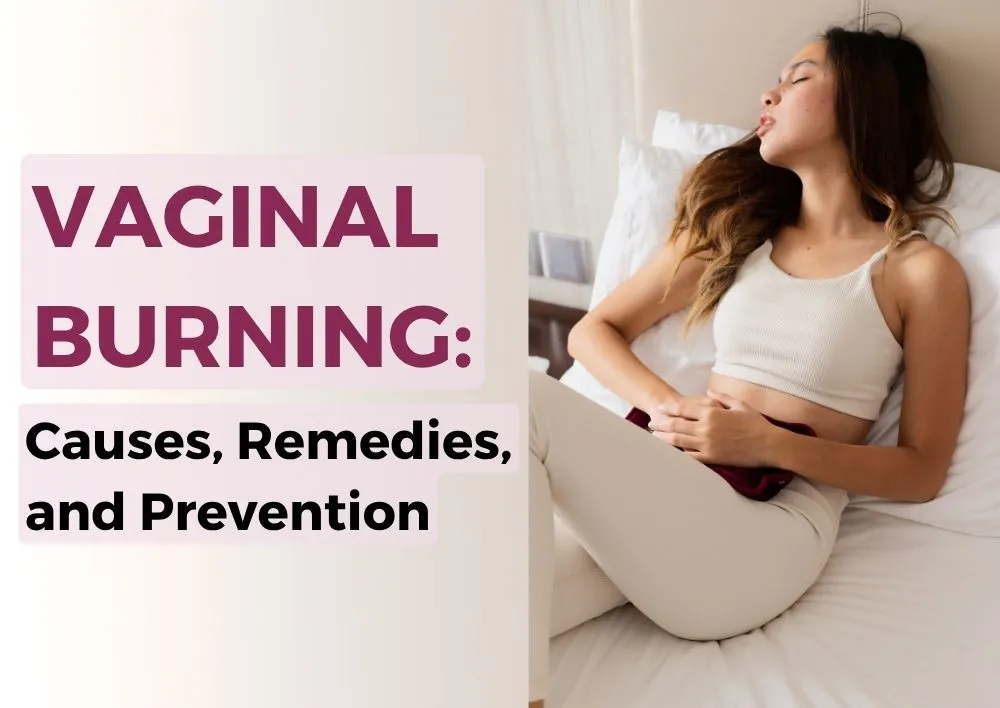Vaginal Burning: Causes, Remedies, and Prevention
Summary: Vaginal burning is a common concern that may arise due to infections, irritants, hormonal changes, or skin conditions. Symptoms often include itching, redness, discomfort during urination or intercourse and abnormal discharge. Treatment depends on the underlying cause and may include antifungal or antibiotic medications, antiviral therapy, estrogen creams, or allergy management.
Overview:
A burning sensation in the vaginal area can be uncomfortable, distressing, and sometimes even alarming. It is a common symptom many females experience at some point in their lives, but it should never be ignored. Vaginal burning can have multiple causes from infections to hormonal imbalances and the right treatment depends on the underlying reason.
In this blog, we will discuss the common causes, effective remedies, and important preventive tips to help you stay informed and in control of your intimate health.
What is Vaginal Burning?
Vaginal burning refers to a stinging, itching, or irritating sensation around the vaginal area. It may occur during urination, intercourse, or even at rest. While it can be a temporary issue, ongoing or recurring symptoms require medical attention.
Dr. Sadhna Sharma, Senior Gynae in Gurgaon at Miracles Apollo Cradle says: “Vaginal burning is usually misunderstood or ignored by many women due to embarrassment or misinformation. It is important to remember that this symptom is your body’s way of signaling a potential imbalance or infection. Early consultation not only brings relief but also helps identify conditions like STIs, hormonal issues, or skin diseases that may otherwise worsen over time. Don’t delay in seeking care; it can make all the difference in maintaining long-term vaginal health.”
Common Causes of Vaginal Burning
Understanding the cause is essential to treating the condition. Here are the most common reasons behind vaginal burning:
1. Yeast Infection
One of the most frequent causes of yeast infections is caused by an overgrowth of the Candida fungus. Symptoms usually include:
-
Itching and burning
-
Thick, white discharge
-
Redness or swelling
2. Urinary Tract Infection (UTI)
UTIs can cause burning during urination and discomfort in the lower abdomen. If not treated on time, it can lead to serious kidney problems.
3. Bacterial Vaginosis (BV)
An imbalance in vaginal bacteria can result in BV. Common symptoms include:
-
Burning sensation
-
Thin, grayish discharge
-
Fishy odor
4. Sexually Transmitted Infections (STIs)
STIs like chlamydia, gonorrhea, herpes, or trichomoniasis may cause burning, unusual discharge, and pain during intercourse.
5. Allergic Reactions or Irritants
Harsh soaps, scented wipes, bubble baths, or laundry detergents can irritate the sensitive vaginal skin, leading to burning.
6. Menopause or Hormonal Changes
A drop in estrogen levels can cause vaginal dryness and irritation, especially during and after menopause.
7. Skin Conditions
Conditions like eczema or Lichen sclerosus (LS) can also affect the vaginal area and result in burning or itching.
Effective Home Remedies for Vaginal Burning
For mild symptoms, some home remedies can provide temporary relief:
1. Cold Compress
Applying a cold compress to the affected area can reduce inflammation and provide instant soothing relief.
2. Baking Soda Baths
Soaking in a lukewarm bath with a small amount of baking soda can help relieve irritation and balance pH levels.
3. Plain Yogurt
Unsweetened, probiotic-rich yogurt (applied topically or eaten) can help restore healthy bacteria in the vaginal area, especially in cases of yeast infection.
4. Stay Hydrated
Drinking plenty of water helps flush out harmful toxins and keeps your urinary system healthy.
Note: These remedies are for mild irritation. If symptoms continue or worsen, consult a gynecologist near you.
Medical Treatment Options
If the burning sensation is due to an infection or underlying medical issue, your doctor may recommend:
-
Antifungal creams or oral medications for yeast infections
-
Antibiotics for bacterial infections or UTIs
-
Antiviral medications for herpes or other STIs
-
Estrogen creams for post-menopausal vaginal dryness
-
Allergy testing or topical steroids for skin conditions
Getting diagnosed and treated on time is important for full recovery and to prevent any complications.
How to Prevent Vaginal Burning?
Preventing vaginal burning starts with good hygiene and healthy habits:
1. Wear Breathable Cotton Underwear
Wear loose, comfortable clothes and choose cotton fabrics to keep the area dry and prevent irritation.
2. Use Mild, Unscented Products
Stick to unscented soaps, wipes, and feminine hygiene products to avoid irritation.
3. Wipe Front to Back
After using the toilet, always wipe from front to back to prevent bacteria from entering the vaginal area.
4. Practice Safe Sex
Use protection to reduce the risk of STIs and always maintain open communication with your partner about sexual health.
5. Avoid Douching
Douching disrupts the natural vaginal flora and can increase the risk of infections.
6. Stay Hydrated and Eat a Balanced Diet
A strong immune system starts with good nutrition. Include probiotic foods like yogurt and fermented vegetables for optimal vaginal health.
When to See a Doctor
Don’t ignore burning that:
-
Lasts more than a few days
-
Is accompanied by discharge, odor, or bleeding
-
Occurs after unprotected sex
-
Causes discomfort during urination or intercourse
Conclusion:
Vaginal burning is not something to be embarrassed about; it is your body’s way of telling you something might be off. By understanding the causes and taking the right steps, you can find relief and protect your intimate health. If you are experiencing persistent discomfort or need expert guidance, don't wait; book an appointment with a gynecologist near you at Miracles Healthcare. Our experienced team offers compassionate, confidential, and complete care tailored to your needs.
Frequently Asked Questions
Stay hydrated, maintain good hygiene, avoid irritants, and use prescribed medications if caused by an infection.
Yeast infections, UTIs, bacterial vaginosis, and STIs are common infections that can cause a burning sensation.
Dr. Sadhna Sharma at Miracles Apollo Cradle, Gurgaon, is a highly experienced Gynae known for expert care in treating vaginal burning and related issues.
It can happen due to friction, lack of lubrication, allergies to condoms or lubricants, or underlying infections like BV or STIs.
Mild burning may result from hormonal changes, but persistent discomfort could indicate an infection and should be checked by a doctor.
Common causes include vaginal dryness, irritation from products, infections, or skin conditions affecting the vaginal area.
Hormonal shifts can lead to dryness or sensitivity, and premenstrual changes may trigger mild irritation or underlying infection symptoms.
















Was the information useful?
11 0